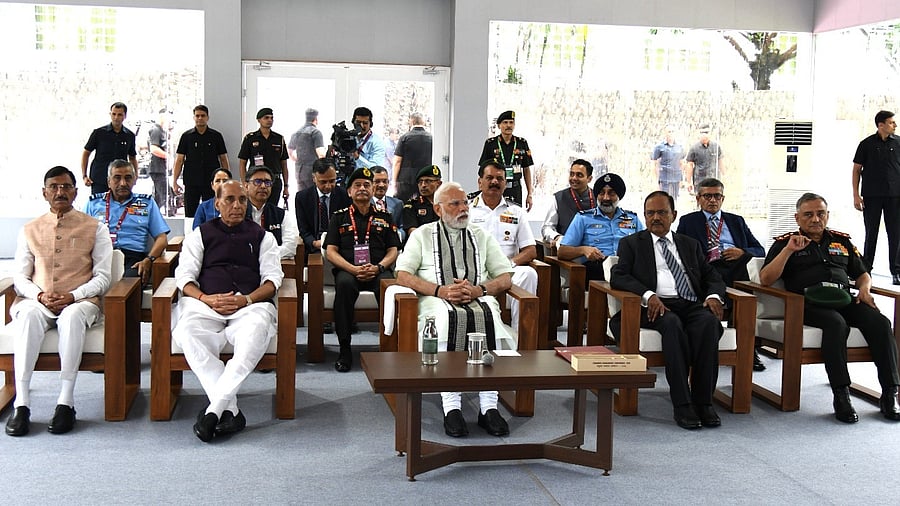
PM Narendra Modi is flanked by Rajnath Singh (left) and National Security Advisor Ajit Doval at the Combined Commanders Conference in Kolkata.
Credit:X/@HQ_IDS_India
New Delhi: Defence Minister Rajnath Singh on Tuesday asked the armed forces to prepare for unconventional threats like “ecological and biological warfare” because of the evolving nature of the warfare, making them “sudden and unpredictable.”
Addressing the Combined Commanders Conference in Kolkata, the minister said the armed forces must go beyond the traditional concepts of war, and remain alert and ready to deal with invisible challenges emanating from unconventional threats such as information, ideological, ecological and biological warfare, which necessitates constant assessment of security threats around the world.
Because of such threats, Rajnath said, there would be a need for constant assessment of the changes taking place across the globe, and its impact on the security system of the country, in view of the turbulent global order, regional instability and the emerging security landscape.
He also brought out the importance of developing adequately surge capabilities and reduction of the teeth to tail ratio.
On much talked about Sudarshan Chakra, he said a committee has been asked to prepare a “realistic action plan” for the next five years to ready the components of the weapon system that would be in place by 2035 protecting key Indian cities and installations.
Underlining the relevance of a “technology-friendly” military in the backdrop of recent global conflicts, the Defence Minister said, “Wars of today are so sudden and unpredictable that it is extremely difficult to foretell its duration. It can be two months, a year, or even five years. We need to be prepared. We need to ensure that our surge capacity remains sufficient.”
The biennial conference – inaugurated by Prime Minister Narendra Modi on Monday – is the top most brain-storming among top military leaders.
The defence minister also flagged the need for “synergy and jointness” among the forces, terming it as “essential” to deal with future challenges, and mentioned creation of Tri-Service Logistics Nodes and Tri-Service Logistic Management Application to promote integration and jointness, according to a statement issued by the Defence Ministry.
The top political leadership, however, did not speak on the proposed theaterisation plan under which 17 existing operational commands will be grouped into a few tri-service integrated theatre commands catering to specific threats.
This is the biggest reform planned in higher defence since independence, being pushed by the Modi government, and is understood to be on the agenda of the conference.
The minister released a joint military space doctrine aiming to strengthen India's synergy across the three services in the space domain for national security and strategic advantage.
The Defence Acquisition Procedure 2020 is also being revised to simplify the processes, reduce delays, and provide operational strength to the forces.
